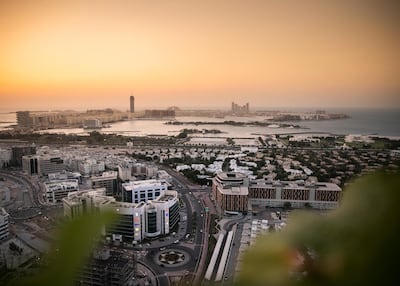Globally, the impact of coronavirus has been felt differently across cities – some have been affected more severely than others. Similarly, economic sectors too have been affected differently in each country and each city.
In Dubai, the effect on air travel, tourism, construction and real estate have been undeniable. While we all hope that 2021 will bring relief from this year's challenges, it is not a useful strategy to simply hope.
Looking ahead, we must consider what can be done. What can we learn from this year? More importantly, how can we use the lessons of 2020 to shape the future?
Even as we hope for respite from challenges brought on by the pandemic, we must resolve to take urgent action with a specific focus on the local experience.
A couple of months ago, the Dubai Future Foundation convened online workshops to examine the economic impact and possible routes into the future. We identified three essential insights.
First, there is no going back to the economy that existed before coronavirus. This matters because there are many countries and cities around the world that are attempting to turn back the clock.
Another implication is that the infrastructure and human capital built during the pandemic will remain. Time will tell, however, whether they remain assets or liabilities.
Second, the digital and intangible spheres will be all-important. As we all know, online activity boomed during Covid-19. This will continue to be the case. We have become digital beings – online commerce, online working, online teaching are here to stay.
Third is the undeniable fact that people are united. We are one species, on one planet and our fates are intertwined. While physical borders were closed and some countries stockpiled goods, all countries were quick to reopen to travel, goods and services. As they say, globalisation is dead – long live globalisation.
Roll these three into one and you get, what we call, city-as-a-service. Or more precisely, Dubai-as-a-service.
The city-as-a-service offering is appealing because it is easy, globally accessible and customisable.
Think about it: there are plenty of reasons to relocate to Dubai, including a choice of housing, great international travel connections and an advantageous tax situation. So, the Dubai Tourism Authority was quick to realise this and has implemented a 'one-year virtual working programme', which redefines remote working.
This might just be a means to make up for the economic impact endured, a way to leverage existing assets and capitalise on the global supply of high-value work.
In essence, working professionals from around the world who meet the criteria can move to Dubai and make the city their base for working remotely. Such a scheme comes on the back of similar ones offered by countries such as Barbados and Estonia that advertise 'digital nomad visas' to attract start-ups and entrepreneurs who want to select the most suitable and appealing location for their work.
Such steps aim to attract high-value individuals and companies, thus boosting the economy.
In the future, cities may offer add-ons to a basic service. A bit like television subscriptions: a basic one offers a few channels, more money buys more interesting channels. How could cities make use of this approach and make it work for them?
Cities have a certain attraction because of what’s on offer: a vibrant scene, culture, restaurants, interesting people and plenty of opportunities. But they can also be expensive as housing, transport, health and education are factored in – not to mention, the effort of relocating can be a drain on time.
But what if there was an alternative. What if packages were available that included school and housing with an optional add-on for health that you could virtually just click on and add to your basket.
You might have transferable health insurance from your home country, but in case you don’t there would be options for add-ons, for transport (a basic add-on would include public transport, a high-end add-on would include a driver).
Choose length of the service, pick a level of service, select a location, sign digitally and you're all done – your package, the visa and the entry code to your apartment would be on the app. And your sim and driver would wait for you in Dubai.
As cities take steps to attract talent and money, a customisable menu, so to speak, would tempt professionals to relocate. In the future, the appeal of cities-as-a-service will grow.
As people choose a location, such services will become part of the offering that will make such moves easy and thus more feasible. It is not inconceivable to think that there will be waves of nomadic movements of this kind: as a city becomes more popular, prices will increase.
Consequentially and over time, nomads will be quick to relocate. Dubai-as-a-service will vie for the top spots with a view to retain as many people as possible.
With cities-as-a-service the technology, economy, location and globalisation are rolled into one and there is a dire need for creative thinking to reinvigorate economies.
As dramatic a year as 2020 has been, it has also been an innovative, entrepreneurial and creative one. I, for one, look forward to meet the first cohort of Dubai-resident digital nomads in 2021.
Dr Patrick Noack is the executive director of future, foresight and imagination at the Dubai Future Foundation



